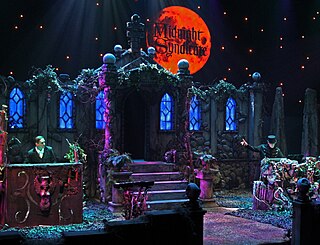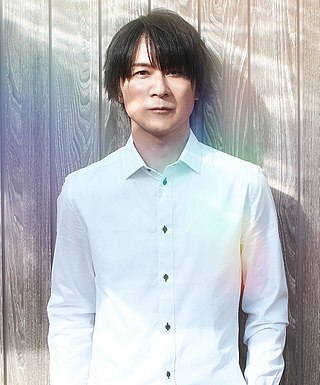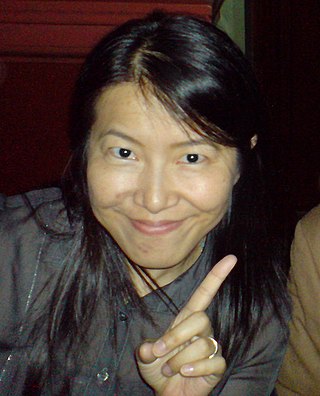
Midnight Syndicate is an American musical duo that has been working primarily in the genre of neoclassical dark ambient music since 1997 and is based in Chardon, Ohio, a suburb of Cleveland.
Final Fantasy is a media franchise created by Hironobu Sakaguchi and owned by Square Enix that includes video games, motion pictures, and other merchandise. The series began in 1987 as an eponymous role-playing video game developed by Square, spawning a video game series that became the central focus of the franchise. The music of the Final Fantasy series refers to the soundtracks of the Final Fantasy series of video games, as well as the surrounding medley of soundtrack, arranged, and compilation albums. The series' music ranges from very light background music to emotionally intense interweavings of character and situation leitmotifs.

The Chrono series is a video game franchise developed and published by Square Enix. It began in 1995 with the time travel role-playing video game Chrono Trigger, which spawned two continuations, Radical Dreamers and Chrono Cross. The music of Chrono Trigger was composed primarily by Yasunori Mitsuda, with a few tracks composed by regular Final Fantasy composer Nobuo Uematsu. The Chrono Trigger soundtrack has inspired four official album releases by Square Enix: a soundtrack album released by NTT Publishing in 1995 and re-released in 2004; a greatest hits album published by DigiCube in 1999, published in abbreviated form by Tokyopop in 2001, and republished by Square Enix in 2005; an acid jazz arrangement album published and republished by NTT Publishing in 1995 and 2004; and a 2008 orchestral arranged album by Square Enix. Corresponding with the Nintendo DS release of the game, a reissued soundtrack was released in 2009. An arranged album for Chrono Trigger and Chrono Cross, entitled To Far Away Times, was released in 2015 to commemorate the 20 year anniversary of Chrono Trigger.
Final Fantasy VII is a role-playing video game by Square as the seventh installment in the Final Fantasy series. Released in 1997, the game sparked the release of a collection of media centered on the game entitled the Compilation of Final Fantasy VII. The music of the Final Fantasy VII series includes not only the soundtrack to the original game and its associated albums, but also the soundtracks and music albums released for the other titles in the collection. The first album produced was Final Fantasy VII Original Soundtrack, a compilation of all the music in the game. It was released as a soundtrack album on four CDs by DigiCube in 1997. A selection of tracks from the album was released in the single-disc Reunion Tracks by DigiCube the same year. Piano Collections Final Fantasy VII, an album featuring piano arrangements of pieces from the soundtrack, was released in 2003 by DigiCube, and Square Enix began reprinting all three albums in 2004. To date, these are the only released albums based on the original game's soundtrack, and were solely composed by regular series composer Nobuo Uematsu; his role for the majority of subsequent albums has been filled by Masashi Hamauzu and Takeharu Ishimoto.

Martin O'Donnell is an American composer, audio director, and sound designer known for his work on video game developer Bungie's titles, such as the Myth series, Oni, the Halo series, and Destiny. O'Donnell collaborated with his Michael Salvatori for many of the scores; he has also directed voice talent and sound design for the Halo trilogy.

The Halo Original Soundtrack is a soundtrack for the video game Halo: Combat Evolved. Composed and produced by Martin O'Donnell and Michael Salvatori for Bungie, the soundtrack was released on June 11, 2002. Most of the music from Halo: Combat Evolved is present on the CD, although some songs have been remixed by O'Donnell in medley form for "more enjoyable" listening. The first piece O'Donnell wrote, known as "Halo", became the basis for Halo's "signature sound" which has been heard in the other games of the main trilogy.

The Halo 2 Original Soundtrack is the soundtrack for Bungie's 2004 video game Halo 2. The soundtrack was released as two separate volumes, released almost two years apart. Volume 1, released at the same time as Halo 2 on November 9, 2004, contains arranged instrumental pieces written by Martin O'Donnell and his partner Michael Salvatori, as well as "inspired-by" tracks from bands Incubus, Hoobastank and Breaking Benjamin. Volume 2 was released on April 25, 2006, and contains all the game music arranged in a suite form.

The music of the Streets of Rage series of beat 'em up games, released in the early 1990s, was primarily produced by Yuzo Koshiro.
The music of the video game Final Fantasy VIII was composed by regular series composer Nobuo Uematsu. The Final Fantasy VIII Original Soundtrack, a compilation of all music in the game, was released on four Compact Discs by DigiCube in Japan, and by Square EA in North America. A special orchestral arrangement of selected tracks from the game—arranged by Shirō Hamaguchi—was released under the title Fithos Lusec Wecos Vinosec Final Fantasy VIII, and a collection of piano arrangements—performed by Shinko Ogata—was released under the title Piano Collections Final Fantasy VIII.

Robert Berry is an American guitarist, bassist, vocalist and record producer, best known for his work with Hush, 3 with Keith Emerson and Carl Palmer, Ambrosia, Alliance, and Los Tres Gusanos. He was previously with The Greg Kihn Band, and as of 2022, he is with progressive band Six By Six on bass, vocals and keyboards, a supergroup with guitarist Ian Crichton (Saga) and drummer Nigel Glockler.

The music of the Kingdom Hearts video game series was composed by Yoko Shimomura with orchestral music arranged by Kaoru Wada. The original soundtracks of the games have been released on three albums and a fourth compilation album. The soundtracks to the Kingdom Hearts games feature several musical pieces from both Square Enix and Disney works, including such pieces as "Mickey Mouse Club March" by Jimmie Dodd, "This Is Halloween" by Danny Elfman, and "One-Winged Angel" by Nobuo Uematsu. They also feature several vocal songs, the most notable being the four main theme songs: "Hikari", "Passion", "Chikai", and "Face My Fears." The two themes were written and performed by Japanese American pop star Hikaru Utada; in addition to Japanese, English versions of the first three songs were produced, titled "Simple and Clean", "Sanctuary", and "Don't Think Twice", respectively.
The Chocobo video game series is a spin-off series composed of over a dozen games developed by Square Co. and later by Square Enix featuring a super deformed version of the Chocobo, a Final Fantasy series mascot and fictional bird, as the protagonist. Several of the titles have received separate album releases of music from the game. The music of the Chocobo series includes soundtrack albums for the Chocobo's Mysterious Dungeon sub-series—comprising Chocobo's Mysterious Dungeon, Chocobo's Dungeon 2, and Final Fantasy Fables: Chocobo's Dungeon—and soundtrack albums of music from Chocobo Racing, Final Fantasy Fables: Chocobo Tales, and Chocobo and the Magic Picture Book: The Witch, The Maiden, and the Five Heroes, as well as an album of arranged music from Chocobo's Mysterious Dungeon and a single entitled Chocobo no Fushigina Dungeon Toki Wasure No Meikyuu: Door Crawl for the theme song of Final Fantasy Fables: Chocobo's Dungeon.
The Final Fantasy Crystal Chronicles video game series consists of Crystal Chronicles, a spin-off of the main Final Fantasy series, its sequels My Life as a King and My Life as a Darklord, and their spin-offs, Ring of Fates, Echoes of Time and The Crystal Bearers. Crystal Chronicles, Ring of Fates, and Echoes of Time have had released soundtrack albums to date, and Crystal Chronicles and Ring of Fates each have an associated single. Kumi Tanioka is the main composer for the series, having composed the three released soundtracks as well as the music for My Life as a King and My Life as a Darklord. Hidenori Iwasaki is filling that role for The Crystal Bearers. Nobuo Uematsu, the main composer for the regular Final Fantasy series, contributed one track to the Ring of Fates soundtrack. Yae and Donna Burke sang the Japanese and English versions of the theme song for Crystal Chronicles, respectively, while Aiko sang the theme song for Ring of Fates.
The Mother series is a role-playing video game series created by Shigesato Itoi for Nintendo. The series started in 1989 with the Japan-only release of Mother, which was followed up by Mother 2, released as EarthBound outside Japan, for the Super NES in 1994. A second sequel was released in Japan only, Mother 3, for the Game Boy Advance in 2006. The music of the Mother series includes the soundtracks to all three games; the first game was composed for by Keiichi Suzuki and Hirokazu Tanaka, who were joined by Hiroshi Kanazu for the second game, while Mother 3's score was written by Shogo Sakai.

Mark S. Berry is an American music and film producer, and the chairman of AMG. He has worked with Grammy and Juno nominated artists such as Carly Simon, Paul McCartney, David Bowie, Duran Duran, Billy Idol, Boy George, Yes, Joan Jett, Cameo, Voivod and Kool & The Gang.

Neil Davidge is an English record producer, songwriter, film score composer, musician, and occasional backing vocalist. Once an associate of dance producers DNA, he is best known as the long-term co-writer and producer for the music production outfit Massive Attack. In 1997, he also produced the Sunna album One Minute Science. During that time he has established a career as a film score composer including projects such as Push, Bullet Boy, Trouble the Water, and additional music for Clash of the Titans.
The music for the 2011 neo-noir detective video game L.A. Noire, developed by Team Bondi and published by Rockstar Games, was composed by musicians Andrew Hale and Simon Hale. Recorded at Abbey Road Studios in London, the score also features contributions from Woody Jackson, who had collaborated with Rockstar on other projects both previously and since. Andrew Hale felt that composing the game's score was about setting a mood, attempting to compose music that felt accessible to players. The score was inspired by films from the 1940s, though the team avoided specifically composing for this time period, instead opting to focus on that after the music had been produced. Three supplementary vocal recordings were composed by The Real Tuesday Weld and performed by Claudia Brücken; they also sought to fit with the game's setting.

Celeste is a 2018 platform game developed and published by indie studio Maddy Makes Games. The player controls Madeline, a young woman with anxiety and depression who aims to climb Celeste Mountain. During her climb, she encounters several characters, including Part of You a personification of her self-doubt who attempts to stop her from climbing the mountain.

The music of Rocket League, a vehicular soccer video game developed and published by Psyonix, is a compilation of electronic dance music (EDM) produced and curated by Psyonix audio director Mike Ault. It currently features music from 45 different artists, and has spawned a discography of four albums and four extended plays. The original soundtrack was produced by Ault and his band Hollywood Principle. Ault, having experimented with different genres, used personal projects unrelated to Rocket League as a base for the soundtrack. What followed was an EDM soundtrack inspired by early-to-mid 2000s progressive house music that Ault and Psyonix felt "embodied the spirit of the game." When in-game, the music is controlled using the playlist system "Rocket League Radio". Positive feedback from players, in addition to Ault's vision of a "big budget" playlist sound emulating Triple-A sports games such as the EA Sports titles, inspired him and the team to feature independent artists to be included in Rocket League's soundtrack. Ault credits the success of the soundtrack to the appeal of the EDM genre to the game's player base. In 2017, Canadian EDM label Monstercat partnered with Psyonix and began to feature its artists, and their music, in Rocket League, with multiple volumes featuring the music being released by the label.
The music of the Dead Space media franchise, created by Visceral Games and published by Electronic Arts around a series of survival horror video games, was mainly composed by Jason Graves. Graves composed the music for all mainline entries in the series and the majority of spin-off titles. Other composers have been involved in the series; Grave's recurring collaborator Rod Abernethy acted as an early advisor for the titular first game, James Hannigan co-composed the score for Dead Space 3, while the 2023 remake of the first game combined original music with contributions by Trevor Gureckis. Scores for the movies Dead Space: Downfall and Dead Space: Aftermath were respectively composed were Seth Podowitz and Christopher Tin.












